DIALOGO COM O GOVERNO ANGOLANO
OS TRAIDORES VENDILHOES DA NOSSA TERRA
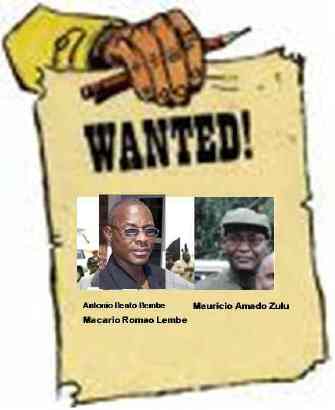
*********************
Isto é a igualdade de todos perante a lei. Uma lei para os amigos (protegidos) e outra para os outros segum o direito angolano.
O que protege um criminoso é também considerado criminoso. Cada ovelha busca a sua parelha. Bento Bembe e socios não podem ser blanquedos antes de eles responderem do seu papel na captura do Norte-americano diante o mesmo tribunal que tinha condenado Tchibassa. Esta é a logica.

Accords scélérats ou Accords de paix Angola-Cabinda c'est la même chose.
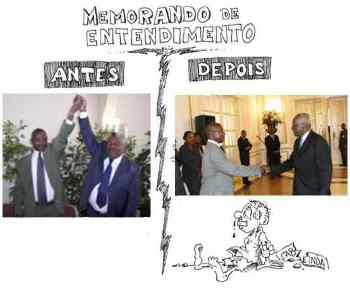
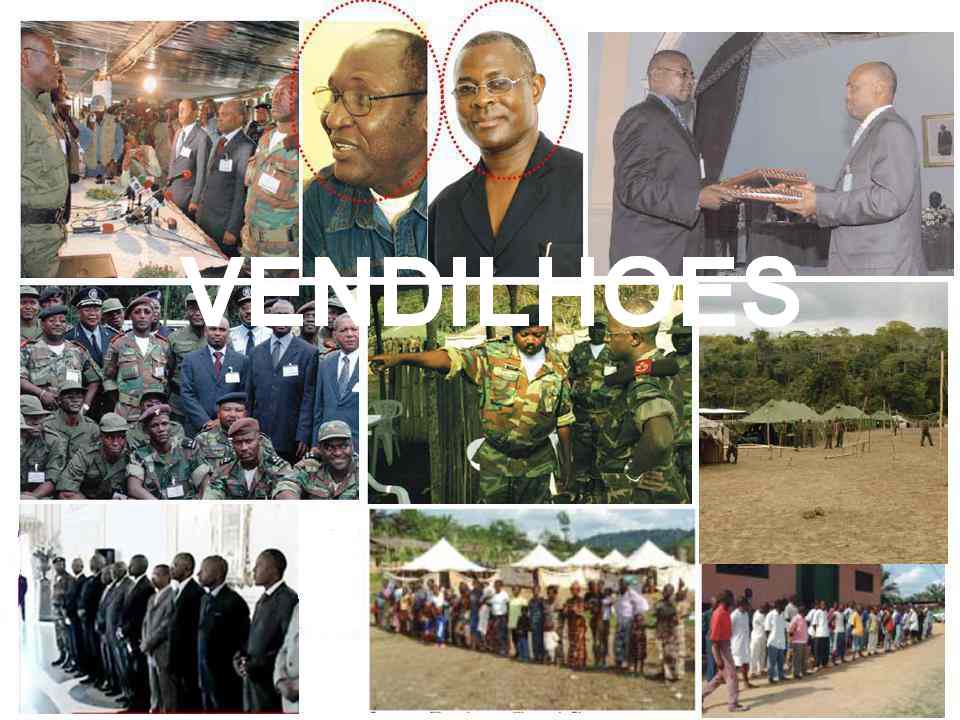
Em 1 de Agosto de 2006, um pequeno grupo de Cabindas cujos líderes Antonio Bento Bembe e Mauricio Amado Nzulu, ambos mencionados na lista internacional de Interpol, po captura e sequestro de um cidadão norte-americano em 1992, deslocaram-se para Namibe (província do Sul de Angola), onde entregaram-se pés e mãos ligados às autoridades angolanas, estabelecendo uma paz truncada cujas negociações tiveram lugar em Brazzaville, e tudo em prejuizo dos interesses superiores do conjunto do povo cabindês que continua a sofrer de multiples exacções e humilhações. Mais tarde, o primeiro foi nomeado ministro sem pasta, e o segundo, chefe de Estado-maior associado responsável pelo social. Quanto ao resto da banda, são acantonados em lugares azedos. Um dentre eles, oriundo de Cabo Verde, e antigo informador do poder angolano, José Gualter, foi o melhor recompensado, ocupando o posto de vice-ministro do petróleo. Um dos líderes cabindas, Arthur TCHIBASSA, capturado pelo FBI em Julho de 2002, em Kinshasa esta detido para 24 anos numa das mais duras prisões americanas. O seu caso nem sequer foi evocado. Assunto a seguir...
*******************
Le 01 août 2006, un groupuscule de Cabindais dont les leaders Antonio Bento Bembe et Amado Mauricio Nzulu, tous deux fichés dans la liste internationale d'Interpol, pour enlèvement et séquestration d'un américain en 1992, se sont rendus en Namibe (province du sud de l'Angola), et se livre pieds et mains liés aux autorités angolaises, en établissant une paix tronquée dont les pourparlers ont eu lieu à Brazzaville, au détriment des intérêts supérieurs de l'ensemble du peuple cabindais qui continue de subir moult exactions et humiliations. Actuellement, le premier a été nommé ministre sans portefeuille, et le second, chef d'Etat major adjoint chargé du social. Quand au reste de la bande, ils sont cantonnés dans des lieux austères. L'un d'entre eux, originaire du Cap-Vert, et informateur de longue date du pouvoir angolais, José Gualter, est mieux récompensé, en occupant le poste de vice-ministre du pétrole. Pour preuve, un des leaders cabindais, Arthur TCHIBASSA, avait été enlevé par le FBI en juillet 2002, à Kinshasa, et est détenu pour 24 ans dans une des plus dures prisons américaines. Son cas n'avait même pas été évoqué. Affaire à suivre...
Pour voir le travail sale fourni par le traître et vendu Bento Bembe et associés, Cliquer ici ====>
Para ver o trabalho sujo do traidor e vendilhao Bento Bembe e Sócios
clique aqui ====> Video 1 Lien vers http://bra.toky.eu/video_amatoriali_player.asp?video=5L-LazTsBMg&v=Cabinda
Video 2 Lien vers http://bra.toky.eu/video_amatoriali_player.asp?video=H-e7f8K6FXI&v=Cabinda
Video 3 Lien vers http://bra.toky.eu/video_amatoriali_player.asp?video=7gjjHGSJHr4&v=Cabinda
Lien vers http://www.youtube.com/watch?v=IA-NS9bQvM0
Ouvir a canção Mwane-mwane_Tchitcho Clique aqui ====>
Lien vers http://www.dailymotion.com/relevance/search/cabinda/video/x3xedq_mwanemwane-tchitcho_music
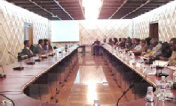
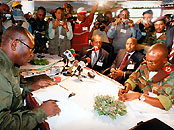
TERMINOS DA CONTRA-PROPOSTA DO FCD
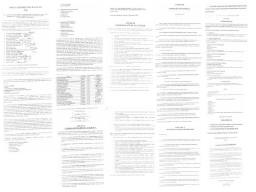
A VERDADEIRA CARA DO BENTO BEMBE
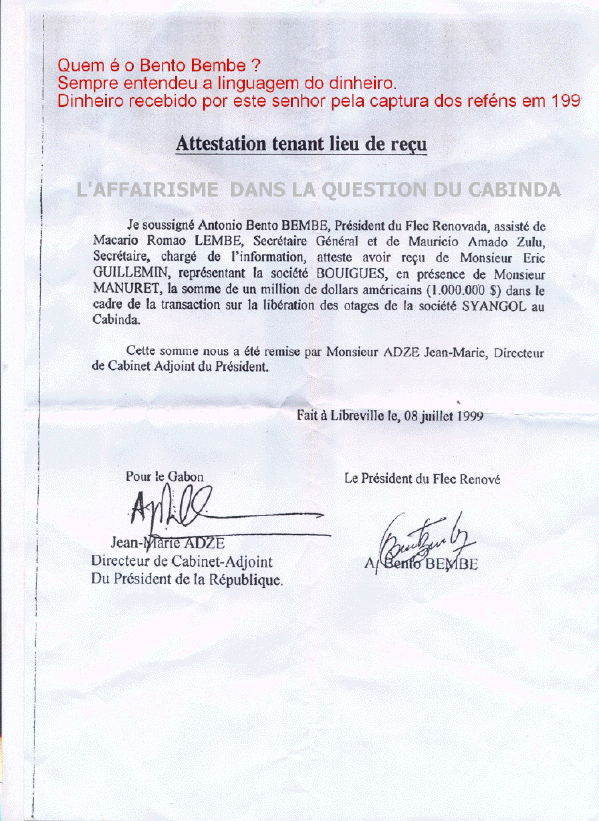
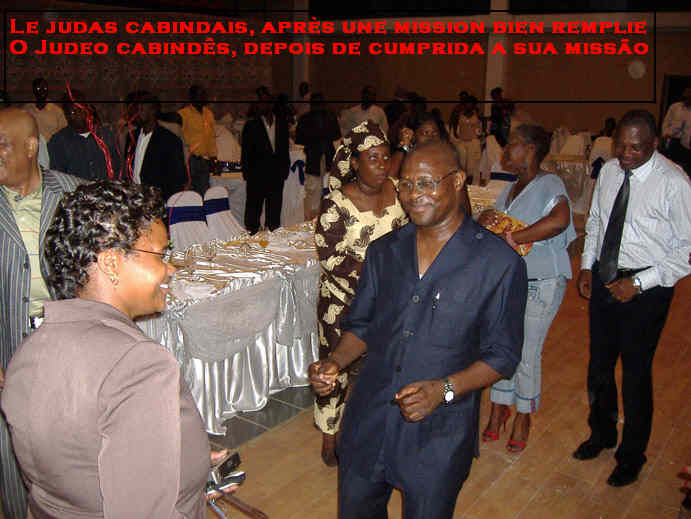
O PRECIO DA TRAIÇÃO DO BENTO BEMBE, O SACRIFICADOR DOS INTERESSES DO POVO DE CABINDA
Nos próximos dias, poderão ser publicadas as nomeações e seguidamente serão empossados os referidos quadros, disse Bento Bembe. A nível, do Governo Central será nomeado um ministro de estado (sem pasta), 3 vice-ministros (do Interior, dos Petróleos e da Agricultura), nove membros no governo provincial de Cabinda (incluindo um vice-governador), nove para cargos de direcção nalgumas empresas públicas (Sonangol, Porto de Cabinda, AngolaTelecom-Cabinda, Rádio provincial de Cabinda e Televisão Pública de Angola (TPA-Cabinda) bem como nove para corpos diplomáticos de Angola nalguns países da Europa e de África, entre os quais ministros conselheiros e secretários.
O seja, tantos anos de sacrifício, morte de mais de 10.000 oriundos de Cabinda mortos em 30 anos de luta por pouca coisa.
_______________________________
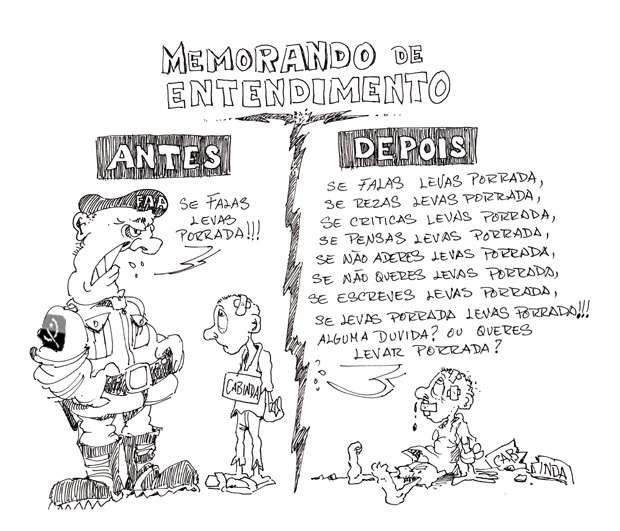
PORQUE E QUE O SUPOSTO ACORDO ASSINADO POR BENTO BEMBE COM O GOVERNO ANGOLANO, ACORDO CONHECIDO COMO "MEMORANDO DE ENTENDIMENTO PARA A PAZ EM CABINDA" É UMA BURLA PARA O POVO DE CABINDA
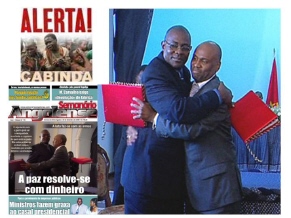


Versão Portuguesa
A solução adoptada no quadro do Fórum Cabindês para o Diálogo (FCD) não é viável pelas seguintes razões :
1. As condições suspeitas em que foi criada em Helviort (Holanda) esta estrutura ;
2. O facto de que, por motivos desconhecidos, vários outros movimentos políticos de Cabinda não foram convidados neste encontro ;
3. A existência de dúvidas quanto a independência, o desinteresse pessoal, a probidade, a representatividade e, por via de consequência, a legitimidade dos membros compondo esta estrutura qualificada curiosamente pelo Governo angolano de “interlocutor válida” e única habilitada a representar e defender os interesses do Povo de Cabinda ;
4. O que oculta o interesse súbito das autoridades angolanas de agrupar certos movimentos de Cabinda entorno duma organização encabeçada por elementos sob processo judicial ;
5. O carácter pouco sério do chamado “estatuto especial” proposto pelas autoridades angolanas aos membros da FCD, na medida em que o texto que lhes foi submetido não representava outra coisa que a transcrição dos procedimentos aplicados indiscriminadamente a todas as províncias de Angola ;
6. A personalidade mesma de Bento Bembe que, não só tem contas a ajustar com a justiça americana, mas que também é considerado pelos observadores internacionais como um homem não livre, e pelo Povo de Cabinda como um traidor a sua causa, às ordens do Governo de Angola.
Com efeito, como sabe-se, detido na Haia na Holanda e objeto de um pedido oficial de extradição do Departamento do Estado norte-americano, este saiu clandestinamente dos Países Baixos trasitando pela Bélgica com nas mãos um passaporte diplomático angolano à vista de escapar à justiça holandesa e americana e desta maneira, não responder das acções do seu movimento, enquanto que um dos seus colaboradores, na pessoa do Sr. Arthur Tchibassa, comprometido no mesmo assunto de captura de reféns, um acto reprehensível quanto ao direito internacional e à lei norte-americana, foi detido, julgado, condenado e expurga actualmente nos Estados Unidos uma sentença de cerca de 25 anos de encarcelamento.
De acordo com a legislação norte-americano (lei 18 USC 1203 dos Estados Unidos ou lei sobre a prevenção e castigo do crime por captura de reféns) aprovada em Outubro de 1984 em conformidade com a Convenção da ONU sobre a questão dos reféns, o rapto de um cidadão americano, onde que for no mundo, é um acto criminal, da igual maneira como os raptos em que o Governo dos Estados Unidos é alvo ou se o autor da captura dos reféns é um cidadão americano.
Portanto, sendo a lei igual para todos, é surpreendente constatar que, para o mesmo delito o Sr. Arthur Tchibassa é o único em ser sancionado, enquanto que o Sr. António Bento Bembe, o responsável principal do movimento incriminado está a gozar de um tratamento preferencial (política de dois pesos e duas medidas) em relação às existentes convenções sancionando a captura de reféns tais como :
A Convenção de Genebra de 12 de Agosto de 1949 (particularmente a sua parte IV relativa à proteção das populações civis em tempo de guerra) e os seus protocolos adicionais de 1977 ;
A convenção internacional contra a captura de reféns, assinada em Nova Iorque em Dezembro de 1978 (objecto da resolução 34/146 das Nações Unidas) nunca ratificado por Angola ;
O Estatuto de Roma do Tribunal Penal Internacional (TPI) qualificando a captura de reféns como crime de guerra ;
As resoluções da Assembleia Geral da ONU 2001/38 de 23 de Abril de 2001, 57/220, de 18 de Dezembro de 2002 e a resolução 2003/40 da Comissão dos direitos humanos que condenando a captura dos reféns onde que seja no mundo.
Se falamos disso é por motivo de bom senso e de equidade.
Nós pensamos que esta postura de Angola consistindo a proteger criminosos não está em harmonia com as boas prácticas devendo governar as relações diplomaticas e o direito internacional e, além disso, não enaltece as boas relações que devem existir entre os Estados Unidos e Angola, um país considerado como parte integrante da seguridade interior dos Estados Unidos.
Ao recusar de conformar-se a estes instrumentos no quadro das relações amigáveis existentes entre Angola e Estados Unidos, o Estado angolano reconhece implicitamente, tal estipulado no artigo 12° desta convenção, que o acto de captura de reféns foi exercido no quadro dum conflito em que o Povo de Cabinda “estava a lutar contra a dominação colonial e a ocupação extrangeira… no exercício do direito dos povos a dispor deles próprios, consagrado pel Carta das Nações Unidas e a Declaração relativa aos princípios do direito internacional tocando as relações amigáveis e a cooperação entre os estados de acordo com a Carta das Nações Unidas”.
Para um Estado de direito verdadeiramente responsável, preocupado pelo bem-estar e a seguridade dos “seus cidadãos”, fora das convicções políticas e religiosas de cada um, o Sr. Arthur Tchibassa que não era um elemento insignificante na hierarquia da FLEC-Renovada deveria ter beneficiado, como foram-lo os senhores Tibúrcio Zinga Luemba (ontem), Bento Bembe e sócios (hoje), do mesmo tratamento e protecção.
7. O suposto “interlocutor válido”, que infelizmente não é outro que o líder da FLEC-Renovada, aliada pela força de circunstâncias à FLEC-FAC no quadro do Forum Cabindês para o diálogo (FCD), uma estrutura criada pelos serviços secretos angolanos com o fim de ser instrumentalizada), dois grupos reputados pelas suas acções de captura de reféns ;
8. Trata-se duma solução imposta que somente satisfaz os interesses do Estado Angolano e de um núcleo de indivíduos em busca duma posição social e de vantagems materiais como se a luta iniciado pelo Povo de Cabinda nos arredores dos anos 1945 somente tinha por objecto a busqueda do bem-estar social como não falta de declarar-lo as autoridades angolanas (Cf. Declaração feita à emprensa norteamericana pelo presidente José Edurdo dos Santos no fim da visita efectuada nos Estados Unidos em Março de 2002) ;
9. A solução proposta está opõe-se aos princípios do direito internacional, particularmente ao direito dos povos à autodeterminação, sendo Cabinda como foi já foi dito um Território Não Autónomo protegido pelo direito internacional ;
10. A solução preconizada somente constitui um artifício provisional que não resolve o problema fundamental isto é, a satisfação das reivindicações originais do Povo de Cabinda fundados sobre elementos históricos, geográficos e jurídicos acima relembrados, e além disso não oferece nenhuma forma de garantia de paz a curto, médio e longo prazo, na medida em que o acordo dito de “entendimento para a paz em Cabinda” é alvo de contestação :
a) por falta de adesão da maioria dos Cabindas e violação das regras da democracia ;
b) por ser do ponto de vista do direito, um acordo sujeito à nulidade por ser fundado sobre a coerção e corrupção.
A esse respeito, nos permitimos lembrar uma reflexão sensata feita anos atras pelo Exmo. Sr. Francisco Sá Carneiro, antigo Primeiro-ministro de Portugal (30/01/80 - 4/12/80) tratando-se da descolonização ao sustentar que : “(…) Soluções apressadas, embora na aparência proveitosas, podem abrir caminho a futuras guerras (…)” (Discurso no primeiro Comício do PPD – Lisboa 25/10/74).
c) por ser percebido como um acordo de adesão às teses do Governo sobre a questão de Cabinda em troca duma atribuição de postos à níveis local, governamental, diplomático aos naturais de Cabinda que aceitariam esta política de integração ;
d) pelo carácter interno deste acordo que não oferece qualquer tipo de garantia à nível internacional e, além disso, não corresponde aos compromissos contraídos em 1992 pelas autoridades angolanas que previam negociações em conformidade com as normas do direito internacional ;
Somos dos que pensam, tal estipulado na Convenção de Viena sobre o direito dos tratados, “todo acordo livremente aceito deve ser executado de boa fé”. Fora disso, que credibilidade poderia-se conceder aos membros de um governo que, depois de ter contraído compromissos, atreveriam-se, segundo as circunstâncias e a favor de novas alianças, de adoptar uma posição confusa e de todo repor em questão como se nada teria acontecido antes, sob o único argumento que isto seria a pôr na conta do passado.
Dar apoio a semelhante anacronismo seria igual dar a sua caução à arbitrariedade, ilegalidade e a anarquia.
Imaginamos um momento a desordem que resultaria se, em consequência do sucesso da política chinesa na África e da ressurgência do interesse russo em Angola, as autoridades angolanas tomassem a decisão de repor em questão os acordos de exploração petrolífera concluído em 2004 estendendo a 30 anos suplementares o contrato concedido inicialmente à empresa norte-americana Gulf Oil Co., uma subsidiária de Chevron, ou em consequência da indecisão do Presidente dos Santos de fixar a data exacta das eleições e da lentidão dos avanços democráticos em Angola, a UNITA adoptasse a mesma atitude negativa dizendo respeito aos acordos de paz assinados em Abril 2002 depois do falecimento do seu líder histórico, o Dr. Jonas Savimbi.
11. O Sr. Bento Bembe foi exonerado das suas funções como presidente do FCD pelos outros membros desta estrutura muito antes da conclusão de ditos acordos ;
12. As outras componentes do FCD compostos da FLEC-FAC, FLEC-Renovada, Palabanda, a sociedade Civil e uma parte do Clero autóctone não foram envolvidos nestes acordos ;
13. A maioria da população é hostil aos términos de ditos acordos ;
14. Todas as partes representativas do escenário político cabindês não foram associadas nas negociações ;
15. No contexto geopolítico actual, ditos acordos não oferecem nenhuma garantia de estabilidade e segurança requerida tanto pelos investidores, as instituições de desenvolvimento, as organizações caritativas, os países desenvolvidos como os Estados Unidos da América que, desde o 11 de Setembro de 2001, tem decidido diversificar as suas fontes de matérias primas, nomeadamente o petróleo à vista de enfrentar as incertezas do Médio Oriente tornada numa zona pouca segura.
_____________
Inglish Version : WHY THE CURRENT SOLUTION ADVOCATED WITHIN THE FRAMEWORK OF THE CABINDA FORUM FOR DIALOGUE IN CABINDA (FCD) IS REJECTED BY THE POPULATION?
In the letter directed on April 2006 to President George W. Bush through the US Embassy in Brazzaville, the CGNSE already expressed its reservations about:
1- the very suspicious conditions in which had been created, in Helvoirt (Netherlands), that structure;
2- the fact that, for not elucidated reasons, several other movements of the Cabinda political scene had not been invited to the meetings of Helvoirt;
3- the independence, the personal desinterestedness, the probity, the representativeness and consequently the legitimacy of the members composing that structure considered curiously by the Angolan Government as the "valid spokesperson" and the only one entitled to represent and defend the interests of the People of Cabinda;
4- what goes on behind the scenes in the sudden interest from de Angolan authorities for bringing together the Cabinda movements around an organization headed by elements under judicial proceedings;
5- the nature not really serious of the alleged "special statute" proposed by the Angolan authorities to the members of the FCD (Attachment 2), insofar as the text submitted to them only was a faithful transcription of the procedures currently applied to all the provinces of Angola and doesn’t contain any special measure for Cabinda.
In another letter addressed to President Jose Eduardo dos Santos, the Council of Government for the National Salvation in Exile denounced the policy of the Angolan Government aiming to impose to the People of Cabinda the so-called “valid spokesperson” and a solution that better suits to it, taking away its responsibility from the consequences of this policy.
That is why, with regard to the tension that continues in Cabinda and, aware that a conflict cannot continue indefinitely because of the human, political, economic, ecological, social, cultural, psychological and spiritual heavy tribute to be paid which cannot afford the underdeveloped countries, we recently have solicited the sponsorship and the implication of the US Authorities in the implementation of the agreements concluded in 1992 (between de Angolan authorities and the Authority of Cabinda) and the opening of real negotiations for a real peace in Cabinda.
So, whatever may be the outcome of a conflict for anyone of the protagonists, negotiation is in our opinion the only one alternative way for a just and long-standing solution.
But why the current solution recommended within the framework of FCD is not viable?
1- The personality of Bento Bembe who, not only has a brush with the American law, but also is considered by many international observers as a non free man, and by the people of Cabinda as a traitor to the Cabinda cause, in the pay of the Angolan government.
Of course, in accordance with the American legislation (Cf. U.S. Law 18 USC 1203, or law for the prevention and punishment of the crime of hostage-taking voted in October 1984 pursuant to the Convention of UNO on hostage-taking), the kidnapping of an American citizen, anywhere in the world, is a criminal act, just as the kidnappings in which the government of the United States is the target or if the author of a hostage-taking is an American national.
So, being the law or conventions equal for all of us, it is paradoxical to notice that for the same infringement Mr. Arthur Tchibassa is the only offender to be punished, meanwhile Mr. Antonio Bento Bembe, the main responsible of implicated movement is enjoying of a preferential treatment in relation to the existing instruments sanctioning the hostage-taking such as:
* The Conventions of Geneva of August 12, 1949 (more specially its part IV relating to protection of the civil people in times of war) and the additional Protocols of 1977 referring to them;
* the International Convention against the hostage-taking, signed in New York on December 17, 1978, object of the UN Resolution 34/146). Till January 1, 2006, Angola hasn’t yet ratified that Convention.
* the Statute of Rome of the International Penal Court qualifying the hostage-taking as a war crime;
* resolutions 2001/38 of April 23, 2001, 57/220 of the UN General Assembly, dated from December 18, 2002 and 2003/40 of the Commission on the human rights condemning the hostage-taking anywhere it occurs in the world.
Therefore, the Angolan State is itself in awkward position in this nasty case.
We think that the attitude of the Angolan government consisting in protecting criminals isn’t in keeping with the good practices governing the diplomatic relations or international law and in addition, is not likely to honour the good relations having to exist between the United States of America and Angola, a country considered as an integral part of the domestic security of the United States (J. Stephen Morrison and Paul Hare, in the future of Custom-Angola Relations, A conference sponsored by the Centre of Strategic and International Studies and the Custom-Angola Chamber of Commerce, CSIS, June 12, 2001, p. 6) and tributary of the preferential commercial clauses (Economic Bulletin of the OTAL, January 2004).
While refusing to comply with those instruments within the framework of the friendly relations existing between Angola and the United States of America, the Angolan State implicitly recognized, as stated by article 12 of the aforementioned international Convention, that the act of hostage-taking had been made within the framework of a conflict in which a People, in this case the People of Cabinda “was fighting against a colonial domination and a foreign occupation… in the exercise of the right of peoples to self-determination, devoted by the UN Charter and the Declaration relating to the principles of international law concerning the friendly relations and co-operation between the States in accordance with the Charter of the United Nations”.
For a State of right, truly responsible, worried for the well-being and security of “all his nationals”, except the political and religious convictions of each of them, Mr. Arthur Tchibassa who was not a negligible element in the hierarchy of FLEC-Renewed could, like Misters Tiburcio Nzinga Luemba (yesterday) and Bento Bembe (today), have enjoyed of the same protection.
2- the so-called "valid spokesperson", who unfortunately is not else than the chief of a group (FLEC-Renewed, since some time allied to FLEC-FAC within the framework of the Cabinda Forum for Dialogue, a structure created, as it is known, by the Angolan secret services with the view to be instrumentalized, but today in breaking-up) famous for their repetitive hostage-taking which widely contributed to tarnish the just cause defended by the People of Cabinda.
3- It is an imposed solution which only satisfies the interests of the Angolan State and excludes the one of the Cabinda People, victim of aggression and constant violations of human rights in its own territory as shown in the enclosed document (Attachment 3);
4- The recommended solution runs counter to the principles of the international law, in particular the right of the people to self-determination, Cabinda being as shown above a NSGT under by the international law;
5- it only represents a trick which doesn’t resolve the basic problem, that is the satisfaction of the original claims of the Cabinda People founded on the elements above mentioned, what does not offer any guarantee of peace in the short, medium and long-term, insofar as that agreement named “Memorando de entendimento para a paz em Cabinda” (Memorandum of arrangement for peace in Cabinda) is already very contested because :
a)it hasn’t obtain the adhesion of the majority of Cabindans and infringe all the rules of democracy;
b)from the point of view of law, that agreement is subject to nullity since it is founded on coercion, corruption.
On this subject, we allow ourselves to point out a made judicious reflexion it y a few years per Mr. Francisco Sa Carneiro, former Prime minister of Portugal (30/01/80 - 4/12/80) and which, being expressed on the question of the decolonization said that: “(…) hasty solutions, although seemingly advantageous, can open the way with future wars (…)” (Discurso no primeiro Comício do PPD em Lisboa - 25/10/74 - I Parte - do 25 de Abril ao 11 de Março – “Textos” - Terceiro Volume - 1974-1975).
We do not think that it is what the Government of the United States wishes.
c)It is perceived as an agreement of adhesion (submission) without no political and legal guarantee intended to muzzle the political expression of the Cabinda specificity and to give one’s support to badly governorship of the territory in exchange of the allocation of posts at the local, governmental, diplomatic levels, etc., to the Cabindans who would agree;
d)Of the internal nature of the agreement which does not offer any international guarantee and what is more, as far we are concerned, doesn’t comply with the commitments made in 1992 by the Angolan government advocating for negotiations in accordance with international norms.
We are among those who think that, as stipulates it the Convention of Vienna on the law of the treaties « all the agreements freely accepted must be executed with the best intentions ». Otherwise, what would be the credibility assigned to the members of a government who, after entering into commitments, take the liberty as circumstances dictate and in favour of new alliances, of calling everything into question as if nothing had occurred before with the only one argument that all that is to be put on the account of the past.
To give support to such anachronism is tantamount to give one’s approval to arbitrary power, illegality and chaos. Let us imagine a moment the upheavals that would result if, following the Chinese breakthrough and the resurgence of Russian interest for Angola, the Angolan authorities had the audacity to call into question the oil agreements concluded in 2004 extending to thirty years extra the duration of the contract initially awarded to the US oil companies, mainly to Chevron, or as a result of the indecision of President dos Santos to appoint the date of elections and the slowness of the democratic changes in Angola, UNITA got to the point of adopting the same negative attitude as regards the agreement of peace signed on April 2002 after the death of Dr. Jonas Savimbi.
e)Mr. Bento Bembe had been relieve of his functions in his capacity as president of the FCD by the other members of that structure long before the conclusion of the said “Memorando de entendimento para a paz em Cabinda”;
f)the other components of the FCD (FLEC-FAC, Palabanda, the autochthonous clergy, etc.) have not been involved parts of these agreements;
g)the majority of the population is hostile to the terms of these agreements;
h)All the representative parts of the Cabinda political scene haven’t been associated to the negotiations;
6- In the international current geopolitics, the solution imposed to Mr. Bento Bembe is not likely to come up to the expectations of the United States of America because it doesn’t offer any kind of guarantee, stability and security expected by the investors, backers and the institutions of development, as well as by the industrialized countries like the United States of America that, since September 11, 2001, decided to diversify their sources of supply of raw materials, more specially of oil in order to face the uncertainties of the Middle East become a not very sure zone.